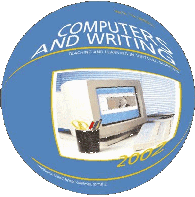 | "Our increasing use of technology has changed our reading and writing practices. This townhall focuses on those changes engendered by technology. How have the multiple forms of electronic texts changed our understanding of composing? By what processes are we building these understandings into our writing instruction? Portfolios, hypertext, synchronous and asynchronous communal texts, and 'the database essay' all have a place in this discussion." |
Michael Day -
Dene Grigar -
Johndan Johnson-Eilola -
Jim Kalmbach -
Becky Rickly -
Paul Taylor -
|
Michael Day – "Microsoftening Style and Innovation"
I'd like to take the question and have some fun with it. I've always
been intrigued at the way the technologies we use for writing shape what
we say and how. Sometime in about 1997 I started jokingly using a the
phrase "Microsoftening and Wordperfecting of the English language" to
refer to what I saw as the increasingly intrusive presence of the
grammar checking software in some of the major word processing programs.
Sure, most of us geeks know how to turn off the green squiggles and
even reset some of the preferences so that the grammar checker might
even help, but do our students know how? Further, do they know how and
why to resist the urge to use templates in programs like Word,
Powerpoint, and Netscape Composer, and how the use of such templates
reflects on their own credibility?
In some ways, I think we need to discuss with our students and each
other the ways in which design features of software packages can
circumscribe our efforts to develop an appropriate and individual voice,
as well as efface our efforts to find new, native online and
hypertextual forms of writing. Unless we call our students' attention
to the restrictive features of these and other software programs, and
encourage them to challenge the preset defaults, we may not be able to
help each other find and explore the rich landscapes of
technology-enhanced and cybertextual writing.
Thus I hope we can discuss the following questions:
- How might software programs such as grammar checkers be discouraging
student writers from taking risks that result in a style and "voice"
they can create and develop as their own?
- How can the use of templates in popular programs such as PowerPoint,
Netscape, Front Page, and Word seductively trap student writers into
structures and formats that short circuit the more elaborated processes
of invention and disposition in the writing process?
And, as a possible extension from software-coercive to networked human group-coercive:
- How might the discursive conventions of online discussion groups lead
student writers to adopt the styles of other, more dominant members of
the groups, at the expense of their own individual writing styles?
 
|
|
